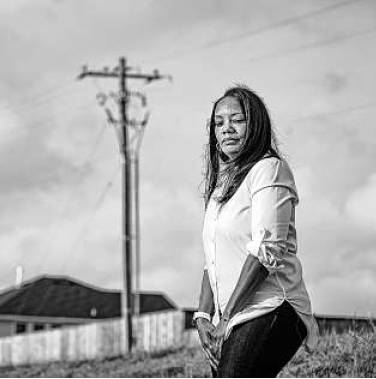More than 400 sue over freeze blackouts
Immunity might be key in ERCOT, utilities case
By Zach Despart STAFF WRITER
A day after her Texas City home lost power in February’s blackouts, Valerie Daniels noticed a rash on her leg. Her whole body ached in the cold, as she bundled up without heat for five days when temperatures dipped below freezing.
Doctors were stumped at first but eventually diagnosed her with a condition called livedo reticularis, a painful skin condition aggravated by cold temperatures. She since has had to give up working as an emergency medical technician, no longer able to manage the physical demands of the job.
“I just wake up, and I’m in pain,” Daniels said. “I’m
50. I feel like I’m in my prime. This has tremendously affected my life.”
Daniels is one of more than 400 Texans that have filed 170 lawsuits against utility companies and state grid operator ERCOT over the blackouts that killed hundreds of people.
The plaintiffs include those directly injured by the cold, those who rely on medical devices that require electricity and relatives of Texans who died during the blackouts, said Daniels’ lawyer, Eric Rhine.
“What occurred back in February continues to impact people — those injured as a result of the loss of electricity as well as those impacted emotionally by the loss of loved ones,” Rhine said.
The cases have been consolidated in Harris County, a common tactic by courts to efficiently process hundreds of filings with similar legal questions and defendants. Gibbs Harrison of Dallas firm Fears Nachawati, which represents dozens of blackout plaintiffs, said the first priority is for the court to resolve several legal questions that will affect the course of the litigation.
These include which defendants have governmental immunity, and thus cannot be sued, and which had a responsibility to ensure the plaintiffs had electricity in their homes. These questions, Henderson said, are key to establishing negligence, which in turn helps determine how much money plaintiffs stand to win in damages.
Once the legal questions are answered, the individual cases may proceed to trial. Henderson said at this point, which he predicted would happen late next year, the defendants would be inclined to reach settlements to avoid the unpredictability of a trial.
“My expectation is once the questions of duty and immunity are resolved, we’re confident the utilities will see looming trial dates and not want to go in front of 12 jurors who went through the freeze and want to hold someone responsible,” Henderson said.
A Houston Chronicle investigation found 194 deaths linked to the blackouts, nearly double the state’s initial count. An analysis by Buzzfeed News found as many as 700 Texans may have died in the cold.
In response, the Legislature passed several bills aimed at avoiding future blackouts, including requiring power plants to weatherize. That provision, however, includes a loophole that allows natural gas producers to pay a $150 fee to sidestep weatherization requirements.
Scientists say another severe cold snap in Texas is unlikely this winter because of dry La Niña conditions.
Daniels said she gets nervous when the weather calls for even a chance of cold, and has arranged to stay with a friend who has a generator if needed.
She said she hopes to receive compensation that can help if she has to retire sooner than planned. She has prepared for a long court battle over her case.
“Mentally, I’m OK with that,” Daniels said. “If it takes a year, two years, my focus is trying to get better.”
Henderson said thousands of additional plaintiffs are likely to join the case once the likely results become clearer.
“In a state of 20-plus million people, almost everyone was affected, if not in a physical manner, then with their property,” Henderson said. zach.despart@chron.com
